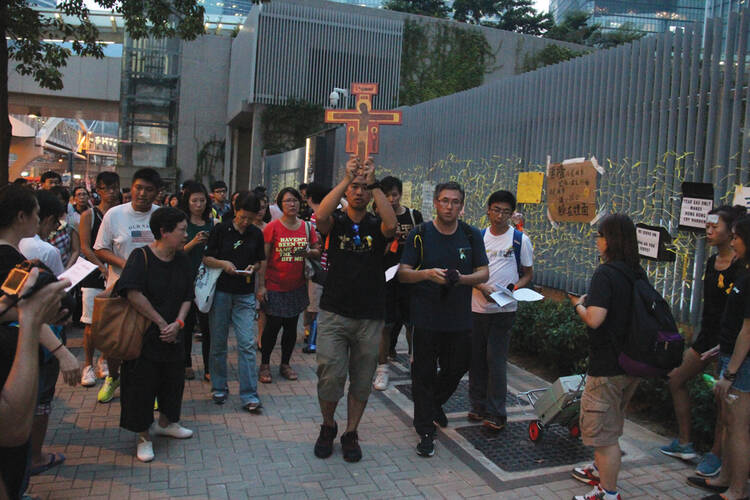Tensions between student demonstrators and authorities in Beijing rose as protests continued for broader democratic rights in Hong Kong in October. On Oct. 3 protesters accused police of allowing pro-government “thugs” to assault them in the city’s Mong Kok district.
“Nothing like this has happened in Hong Kong before. I’m just praying that it won’t become like Tiananmen. The situation is similar in many ways,” said Cardinal Joseph Zen Ze-kiun, speaking by phone from the former British colony on Oct. 1.
The retired 82-year-old cardinal, who led the Diocese of Hong Kong between 2002 and 2009, has been with the Occupy Central protesters since the beginning of the demonstrations on Sept. 27. “I’m very worried,” he said. “The authorities…don’t seem to realize the seriousness of the situation or how angry the people of Hong Kong are. They seem to have no sense of what has happened in these days.
“The protesters are peaceful, but they are waiting for an answer from the government, but no wise answer is coming from the authorities. We have to remain united, nonviolent and peaceful till the end,” he added.
Cardinal Zen suggests that the only way out of this impasse is for the chief executive of this semi-autonomous region of China, Leung Chun-ying, to resign. “If he resigns, then maybe it will be possible for the authorities to open a dialogue and hold a consultation. Maybe Beijing will send somebody who will be able to listen to the people and talk with the leaders of the pro-democracy protest,” he said.
The Shanghai-born cardinal spoke at gatherings as protests accelerated and students in schools and universities across the city boycotted classes in a spontaneous pro-democracy demonstration. Zen explained Catholic social teaching and the right to peaceful resistance and scolded police after they were too rough on the students, reminding them that “students are their brothers and sisters.”
According to the cardinal, protesters want Beijing and Hong Kong authorities to keep the promise given at the time of the colony’s handover in 1997 and allow universal suffrage to the city’s 7.1 million residents. The colony’s Basic Law had promised broad consultation before reaching a decision for the 2017 elections, but when the pro-democracy movement came up with proposals through a public referendum months ago, Hong Kong and mainland governments ignored its input.
Instead, the Hong Kong executive, together with Beijing, decided on a plan that controls the selection of candidates in the election to choose the next chief executive. The Occupy Central movement arose in response and soon converged with the spontaneous student protest efforts.
The Hong Kong diocese with its 374,000 faithful is behind the call for greater democracy, according to the cardinal. Cardinal John Tong Hon, who succeeded Zen as bishop of Hong Kong, has issued a statement calling on the government to exercise restraint and to listen to the people. The diocesan Justice and Peace Commission works in close contact with the student movement and with the Occupy Central leaders, and the cardinal said one of the new auxiliary bishops of Hong Kong, Bishop Joseph Ha, a Franciscan, celebrated Mass in a crowded cathedral on Sept. 30 “to invoke the help of God in the present situation.”
Cardinal Zen said he is going to ask the faithful to pray the rosary throughout the month of October to ask God to enlighten the leaders in Hong Kong and Beijing so that they will listen to the people and work out a plan for real democracy that the people can accept. “I ask people everywhere to pray for us as the situation in Hong Kong is dangerous right now. Anything can happen.”








